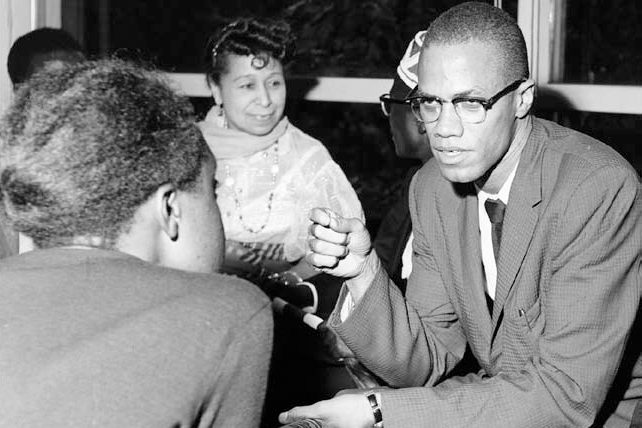
On the 100th anniversary of his birth, his thoughts still light the path to freedom. He was uncompromising in pursuit of racial justice. He is alternately ignored and vilified because he advocated revolution and armed self-defense.
by Megan Cornish
Malcolm X was a towering figure in the Black liberation movement of the 1950s and ’60s. Because his adamant stances are detested by the powers that be, his thinking is often downplayed in favor of the pacifist Martin Luther King Jr.
He was intransigent in the struggle for liberation. “When you hear me say ‘by any means necessary,’ I mean exactly that. Political, economic, social, physical — anything that’s necessary — as long as it’s intelligently directed and designed to get results.”
A brilliant and deep thinker, he never stopped investigating everything he saw and developing his ideas. That’s why in the fight against racism, colonialism and capitalism, his positions resonate more than ever today.
A man of the people
He was born Malcolm Little on May 19, 1925, under Jim Crow segregation and Ku Klux Klan terror that took his parents in his childhood and split the siblings. He quit school at the end of the eighth grade, after his most supportive teacher, who was white, crushed his ambition to become a lawyer, referring to him in the worst bigoted language.
As a young man, he worked a variety of jobs, but also turned to larceny, serving over six years in prison. There he gave himself a higher education and was won over to the Nation of Islam Black separatist organization, taking the name Malcolm X. After prison, he rose rapidly to leadership in the Nation, organized against police brutality and multiplied the group’s membership. The FBI put him under surveillance.
Political evolution
He was a charismatic orator and dedicated teacher. As a political leader, his character was unimpeachable, and he spoke out against corruption, no matter by whom (the head of the Nation, Elijah Muhammad, for instance, for abusing women and fathering children with several of his secretaries). This led to Malcolm being silenced and sidelined in the organization and ultimately leaving it.
Traveling several times to Africa and the Middle East, he learned much from these experiences. He evolved away from segregationist ideas after meeting a committed white Algerian revolutionary. He said, “I’m not going to be in anybody’s straitjacket. I don’t care what a person looks like or where they come from. My mind is wide open to anybody who will help get the ape off our backs.”
He converted to mainstream Islam, and, after making a pilgrimage to Mecca, took the name El-Hajj Malik El-Shabazz.
Speaking on U.S., U.K. and African campuses, he told students, “The young generation of whites, Blacks, Browns, whatever else there is — you’re living at a time of revolution.” And, “One of the first things, I think, young people, especially nowadays, should learn how to do is: see for yourself and listen for yourself and think for yourself. Then you can come to an intelligent decision for yourself.”
Malcolm favored independent political organizing, supporting Fannie Lou Hamer’s independent Mississippi Freedom Democratic Party. He said, “If we don’t do something real soon, I think you’ll have to agree that we’re going to be forced either to use the ballot or the bullet. It’s one or the other in 1964. It isn’t that time is running out — time has run out! … You put the Democrats first and the Democrats put you last.”
His attitudes toward women were respectful, but limited by the sexist teachings of the Nation of Islam. Since his thinking grew and developed throughout his life, many, including this writer, believe that in time he would have embraced women’s liberation.
Near the end of his life, he built the Organization for Afro-American Unity (OAAU) and was speaking at a rally for it in Harlem when he was assassinated on Feb. 21, 1965, by members of the Nation of Islam. Many consider the FBI complicit in the murder, either by actively assisting or because it knew of the plot, yet didn’t expose it.
In his last months, Malcolm explored socialist ideas. “All of the countries that are emerging today from under the shackles of colonialism are turning toward socialism. I don’t think it’s an accident. … You can’t have capitalism without racism.”
Malcolm X’s teaching that smashing racism is crucial and demands the destruction of capitalism still lights our path.
This story first appeared on the Freedom Socialist Party website, at https://socialism.com/fs-article/malcolm-x-icon-of-liberation/. Contact or send comments to FSnews@socialism.com.
Books by and about Malcolm X
“The End of White World Supremacy: Four Speeches by Malcolm X” (1971)
“The Autobiography of Malcolm X: As Told to Alex Haley” (1992)
“By Any Means Necessary — Malcolm X Speeches & Writings” (1992)
“Malcolm X Talks to Young People: Speeches in the United States, Britain, and Africa” (2002)
“The Diary of Malcolm X: El-Hajj Malik El-Shabazz,” 1964 (2013)
“Malcolm Lives! The Official Biography of Malcolm X for Young Readers” by Ibram X. Kendi (originally published May 13, 2025)




